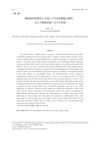 10 citations,
February 2009 in “European urology. Supplement”
10 citations,
February 2009 in “European urology. Supplement” Treatment for benign prostatic hyperplasia involves drugs that either quickly relieve symptoms or reduce prostate size, with a combination offering more benefits but more side effects.
 46 citations,
August 2019 in “Journal of Ethnopharmacology”
46 citations,
August 2019 in “Journal of Ethnopharmacology” Eclipta prostrata has many traditional uses and health benefits, but more research is needed to understand how it works and ensure it's safe.

Glycyrrhizic acid and licorice extract can significantly reduce unwanted hair growth.
 October 2023 in “Biomedical science and engineering”
October 2023 in “Biomedical science and engineering” Innovative methods are reducing animal testing and improving biomedical research.
 December 2023 in “International Journal of Applied Pharmaceutics”
December 2023 in “International Journal of Applied Pharmaceutics” Moringa seed oil helped hair growth in rabbits, with the highest dose being most effective.
 21 citations,
May 2022 in “Frontiers in Cell and Developmental Biology”
21 citations,
May 2022 in “Frontiers in Cell and Developmental Biology” Hair growth and health are influenced by factors like age, environment, and nutrition, and are controlled by various molecular pathways. Red light can promote hair growth, and understanding these processes can help treat hair-related diseases.
February 2023 in “Frontiers in Pharmacology” Water extract of Cacumen Platycladi helps hair growth by activating specific cell pathways.
 3 citations,
June 2023 in “Journal of dermatological treatment”
3 citations,
June 2023 in “Journal of dermatological treatment” Regrowing scalp hair improves quality of life and reduces anxiety and depression in severe alopecia areata patients.
4 citations,
May 2022 in “PeerJ” Melatonin may help hair growth by affecting cell growth and hair-related signaling pathways.
 15 citations,
November 2023 in “Immunity & ageing”
15 citations,
November 2023 in “Immunity & ageing” TLR4 is important in aging-related diseases and could be a new treatment target.
 May 2022 in “Pharmacognosy journal”
May 2022 in “Pharmacognosy journal” Moringa seed oil may help prevent hair loss and promote hair growth.
 November 2023 in “Frontiers in cell and developmental biology”
November 2023 in “Frontiers in cell and developmental biology” Hair aging is caused by stress, hormones, inflammation, and DNA damage affecting hair growth and color.
 1 citations,
September 2023 in “Dermatology and Therapy”
1 citations,
September 2023 in “Dermatology and Therapy” Baricitinib helps improve hair growth in severe alopecia, with better results in less severe cases and higher doses working faster.
 October 2023 in “Frontiers in endocrinology”
October 2023 in “Frontiers in endocrinology” Effective PCOS treatments require targeting specific signaling pathways.
10 citations,
August 2021 in “Frontiers in cell and developmental biology” Scientists made structures that look like human hair follicles using stem cells, which could help grow hair without using actual human tissue.
24 citations,
August 2021 in “Biologics” Stem cell therapy shows promise in improving burn wound healing.
 89 citations,
November 2017 in “Journal of Cellular Physiology”
89 citations,
November 2017 in “Journal of Cellular Physiology” The Wnt/β-catenin pathway is important for tissue development and has potential in regenerative medicine, but requires more research for therapeutic use.
 16 citations,
July 2012 in “Current pharmaceutical biotechnology”
16 citations,
July 2012 in “Current pharmaceutical biotechnology” New treatments for skin conditions related to the sebaceous gland are being developed based on current research.
 69 citations,
April 2019 in “Biomedicines”
69 citations,
April 2019 in “Biomedicines” PRP and HF-MSCs treatment improves hair growth, thickness, and density in androgenetic alopecia.
 June 2020 in “Nihon Ika Daigaku Igakkai Zasshi”
June 2020 in “Nihon Ika Daigaku Igakkai Zasshi” aPKCλ is essential for hair follicle stem cell maintenance and wound healing.
 5 citations,
September 2021 in “Frontiers in Cell and Developmental Biology”
5 citations,
September 2021 in “Frontiers in Cell and Developmental Biology” Dihydrotestosterone treatment on 2D and 3D-cultured skin cells slows down hair growth by affecting certain genes and could be a potential target for hair loss treatment.
 14 citations,
November 2020 in “International Journal of Molecular Sciences”
14 citations,
November 2020 in “International Journal of Molecular Sciences” Advanced therapies like gene, cell, and tissue engineering show promise for hair regrowth in alopecia, but their safety and effectiveness need more verification.
 200 citations,
October 2009 in “European journal of endocrinology”
200 citations,
October 2009 in “European journal of endocrinology” Metformin helps manage polycystic ovary syndrome by improving insulin resistance and ovulation, but more research is needed on its full effects.
20 citations,
June 2021 in “British Journal of Dermatology” Use antimalarials like hydroxychloroquine for cutaneous lupus, avoid herbal supplements, and focus on lifestyle changes like sun protection.
 11 citations,
May 2021 in “Clinical Epidemiology”
11 citations,
May 2021 in “Clinical Epidemiology” Vitiligo is underreported in medical claims and is linked to certain skin types and autoimmune diseases.
 100 citations,
September 2017 in “Molecular and Cellular Endocrinology”
100 citations,
September 2017 in “Molecular and Cellular Endocrinology” Male hormones and their receptors play a key role in hair loss and skin health, with potential new treatments being explored.
 54 citations,
October 2019 in “Cochrane library”
54 citations,
October 2019 in “Cochrane library” Some drugs may reduce prostatitis symptoms short-term with few side effects.
 24 citations,
January 2019 in “Science China Life Sciences”
24 citations,
January 2019 in “Science China Life Sciences” Chitosan/LiCl composite scaffolds help heal deep skin wounds better.
 1 citations,
September 2023 in “Journal of Investigative Dermatology”
1 citations,
September 2023 in “Journal of Investigative Dermatology” Melatonin may protect hair follicle cells from damage caused by a chemotherapy drug.
 23 citations,
May 2019 in “Expert Opinion on Therapeutic Patents”
23 citations,
May 2019 in “Expert Opinion on Therapeutic Patents” New androgen receptor modulators show promise for treating diseases like prostate cancer and muscle wasting.
























